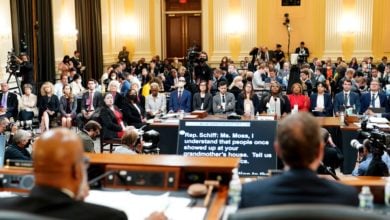States Look for Solutions as U.S. Fentanyl Deaths Rise

The overdose and addiction crisis in the United States of America for the past two decades has become even more severe. State governments have begun to look for solutions.
Legislators in statehouses throughout the nation have considered and adopted laws to reduce the risks for users as well as increase the penalties for fentanyl dealing or mixing with other drugs. While Republican state attorneys general call for greater federal action, some GOP governors deploy National Guard units to stop the flow of Fentanyl from Mexico.
“It’s a fine line to help people and try to get people clean, and at the same time incarcerate and get the drug dealers off the streets,” said Nathan Manning, a Republican state senator in Ohio who is sponsoring legislation to make it clear that materials used to test drugs for fentanyl are legal.
Due to the increasing severity of drug effects, there is an increased urgency. The U.S. Centers for Disease Control and Prevention announced last year that the country had reached a critical milestone. More than 100,000 Americans were killed by drug overdoses during a twelve-month span. This was the first such event. Fentanyl, and other synthetic drugs were responsible for about two thirds of all deaths. These can be up to 50 to 100x more powerful than prescription opioids, heroin, or morphine.
Recent news about five West Point Cadets that overdosed on cocaine-laced fentanyl during Florida spring break brought the dangers and widespread nature of the fentanyl crisis to light.
Most of the drug precursors come from China. They are shipped to Mexico where a large amount of illegal fentanyl supply comes from labs.
While users sometimes seek out fentanyl specifically, it and other synthetics with similar properties are often mixed with other drugs or formed into counterfeit pills so users often don’t know they’re taking it.
Advocates claim that test strips could help to prevent accidental overdoses with drugs laced fentanyl. They are often given at needle exchanges or at other events that involve drug sales or usage.
Thomas Stuber is the chief legislative officer of The LCADA Way in Ohio, a drug rehabilitation organization that services Lorain County, and surrounding areas. He has advocated for test strip legislation. It also would ease access to naloxone, a drug that can be used to revive people when they’re having opioid overdoses.
“This is a harm-reduction approach that has received a lot of acceptance,” he said. “We cannot treat somebody if they’re dead.”
According to the National Conference of State Legislatures, more than a quarter-dozen states, including at least one state, have passed similar laws since last year. At least twelve others are considering them.
West Virginia is the hardest-hit state by opioids. This month, West Virginia lawmakers approved a bill to allow the use of testing strips. Now it goes to the Governor.
Republican lawmakers sponsored the measure. However, Mike Pushkin, a Democrat from central Charleston’s state delegate district, also supported the measure. The situation deteriorated after a law in the state tightened needle exchange regulations, leading to some centers closing.
Pushkin is also in long-term recovery from addiction and is happy with the passage of the testing strips bill. However, he is upset by another law that was passed this month, which would raise the penalty for trafficking fentanyl. This bill will also make it a crime to add fentanyl and other drugs.
“Their initial reaction is, ‘We have to do something,’” he said. “It’s not just about doing something, it’s about doing the right thing that actually has results.”
For many lawmakers however, ensuring that harsh criminal penalties are applied to fentanyl remains a priority.
Janet Nguyen (Republican California Assemblywoman) introduced legislation that would have penalties for dealing in fentanyl as severe as for heroin or cocaine. This Republican is from Orange County where more than 600 fentanyl-related fatalities were reported last year.
“This is sending messages to those who aren’t afraid of selling these drugs that there’s a longer, bigger penalty than you might think,” said Nguyen, whose bill failed to advance from her chamber’s public safety committee in a 5-2 vote last week. After the bill was rejected, she said that she would consider trying it again.
She claimed that committee members stress compassion for drug addicts, which is something she says she supports.
“The less available these pills are out there, the better it is,” Nguyen said. “And that is going after the drug dealer.”
On the same day that her bill failed, a Democratic lawmaker from California introduced a new bill to raise fentanyl dealing penalties.
As of the end of 2017, 12 states had fentanyl possession or trafficking laws, according to The National Conference of State Legislatures. LegiScan analysis showed that at least 19 states have had similar laws or plans since the beginning of 2021. The Associated Press discovered this in an analysis by LegiScan. This does not include any measures to increase synthetic opioids in controlled substances lists to reflect federal law. These have been approved by many states with bipartisan support.
Fentanyl was in Colorado headlines since February. Five people were killed by fentanyl-cocaine overdoses in their suburban Denver apartments.
State law makes possession with the intent to distribute less that 14 grams of Fentanyl an offense punishable by two- to four years in jail. Fentanyl can be deadly. A calculation by the U.S Drug Enforcement Agency shows that 14 grams of fentanyl could equal up to 700 fatal doses.
“It’s making it impossible to hold the dealer accountable for the deadliness of the drugs they’re peddling,” Colorado House Speaker Alec Garnett, a Democrat, said in an interview.
A bill that was also supported by the Democratic Governor was unveiled last week by Jared Polis and a bipartisan team of legislators. Jared Polis proposed that dealers with lower amounts of fentanyl would face increased penalties. It would make it easier to obtain naloxone or test strips, and help people with fentanyl in education and treatment.
Maritza Perez is the director of national affairs for the Drug Policy Alliance. This group advocates for harm reduction measures and opposes legislation that could increase the criminal penalty.
“We have the largest incarceration rate in the entire world and we’re also setting records in terms of overdose deaths,” she said.
Democratic governors have a primary focus on harm reduction. Governor Jay Pritzker of Illinois is one example. Jay Pritzker published a wide-ranging overdose plan last month.
Many Republican attorneys general and governors responded to this rising death rate with administrative enforcement and push for federal intervention.
Texas Governor. Greg Abbott and Arizona Governor. Doug Ducey urged states to protect the border with Mexico. Stopping the flow of Fentanyl was also mentioned as an excuse for not allowing people to enter the U.S. Numerous other Republican governors sent their own contingents of State troopers and National Guard units.
According to the Texas Military Department, more than 1,200 pounds (1,540 kg) of Fentanyl were confiscated by troops at its border between March 2021 and earlier in this month. By comparison, federal authorities reported confiscating about 11,000 pounds (4,990 kilograms) in 2021 — still a fraction of what entered the country.
In 2017, the U.S. Department of Justice had filed approximately 2,700 cases related to distribution of Fentanyl and other synthetic drugs. That’s almost ten times more than in 2017. Yet, Republican state officials continue to criticize federal efforts in stopping fentanyl’s entry into the country.
The 16 GOP attorneys general wrote a January letter to U.S. Secretary of State Antony Blinken requesting that he increase pressure on China, Mexico and other countries to stop the supply of fentanyl. These are the steps Dr. Rahul Gopta, Director of National Drug Control Policy said were already taken.
Patrick Morrisey of West Virginia was adamant that the U.S. Attorney’s General Merrick Garland should be more aggressive in enforcing fentanyl-trafficking laws and imposing harsher punishments.
“Fentanyl is killing Americans of all walks of life in unprecedented numbers,” Morrisey said in a statement emailed to the AP, “and the federal government must respond with full force, across the board, using every tool available to stem the tide of death.”
More Details
Here are more must-read stories from TIME





